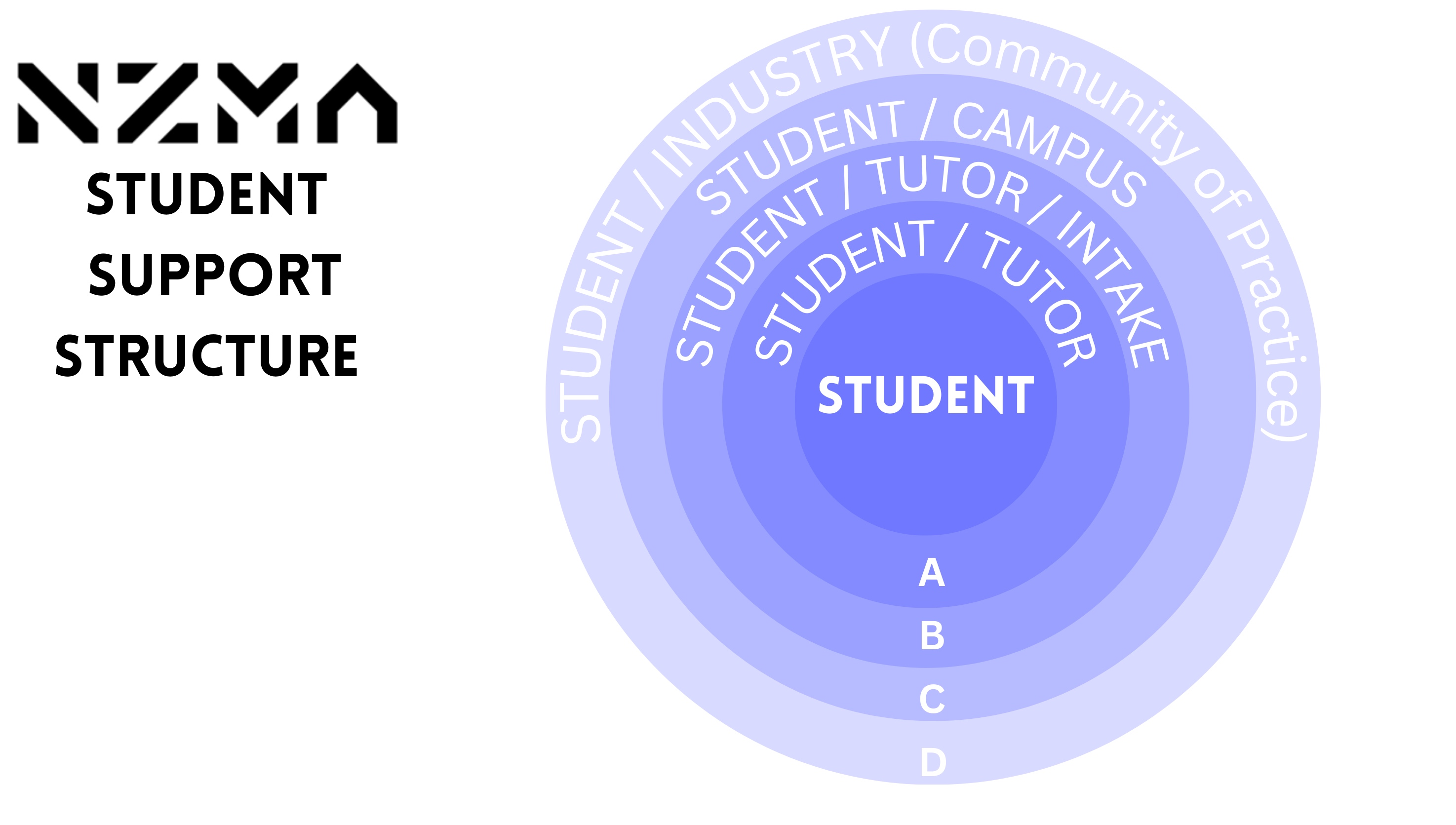An NZMA Online tutor in a facilitated asynchronous learning environment is there to guide, motivate and help the students with their learning when needed. Consider the synonyms facilitator or mentor as equivalent to tutor.
Each programme’s learning material is provided in NZMA Online, so there is no need for ‘classroom’ style learning. Just guidance and advice when needed.
One of the key roles of the online tutor is to keep students engaged and motivated during their programme of study.
Following the Engagement plan, each tutor has engagement points with their classes/intakes that will help keep the students motivated with their learning. Some of these engagement points are linked to content within NZMA Online. Others are linked to moments in the programme.
As a subject expert, the online tutor will also be there to help with any questions about the learning material and be available for students to message via the NZMA Online messaging for any subject question. Or be able to direct the student to the correct place for help for any other question.
As an NZMA Online Tutor, we are still governed by our UP Education Group and NZMA Group policies in relation to privacy, student interaction & ethical behaviour, health & safety, etc. however, some policies, processes and procedures operate a little differently, for example, attendance monitoring and management, new class/intake set up.
For the NZMA Online Campus, all of our campus-specific process & procedural information that slightly differs is found in our NZMA Online Campus Staff Teams Group.
How to be a great Online Tutor
An Online tutor in a facilitated asynchronous learning environment is there to guide, motivate and help the students with their learning when needed. Consider the synonyms facilitator or mentor as equivalent to tutor.
Each programme’s learning material is provided in NZIS Online/NZMA Online, so there is no need for ‘classroom’ style learning. Just guidance and advice when needed.
ONE OF THE KEY ROLES OF THE ONLINE TUTOR IS TO KEEP STUDENTS ENGAGED AND MOTIVATED DURING THEIR PROGRAMME OF STUDY.
Following the Online Student Engagement plan, each tutor has engagement points with their classes/intakes that will help keep the students motivated with their learning. Some of these engagement points are linked to content within NZMA Online. Others are linked to moments in the programme (mid-way through, four weeks from the end of the programme, etc).
As a subject expert, the online tutor will also be there to help with any questions about the learning material and be available for students to message via messaging for any subject question. Or be able to direct the student to the correct place for help with any other question.
What is the Online Tutor’s focus?
A tutor is the connection between the online student and the Online campus. Being an online student can be lonely and difficult; it is easy to lose motivation and procrastinate about doing your work. It can also be overwhelming looking at all the material in the LMS.
The tutor is a guide to this and supports the students to understand the content (or finding someone or somehow to support understanding). It could be by answering a student's question immediately via a message/chat or an email. It could be by sending a video link explaining the details (something you created or have sourced). Or it could be by setting up a 1:1 meeting with you or another tutor. Depends on the question, issue, student, situation, time, etc.
The tutor is also the communicator and a conductor of the course. They might need to help a student understand the learning content, help with time scheduling, provide feedback from an assessment, motivate/support struggling students, mentor at-risk students, and follow up with students who have not engaged or logged in recently or submitted an assessment.
Assessments: The tutor needs to ensure students are keeping up with assessments and needs to be proactive in following up with students who do not submit on the deadline or have re-assessments.

On-campus learning has the joy of having a physical place to create an engaging, creative, spontaneous, fun and synchronous class culture. Online learning can still be engaging, creative, fun and semi-spontaneous. It just requires the tutor and the students to approach the space differently.
Think about how the on-campus creates an awesome class culture. It is about connections, respect, interest in the person as a person (not as a student), honesty, equality, support to understand, kindness/aroha, and autonomy. All of this can be within the Online campus.
Why is it important? It is obvious that students stay connected to their studies because they feel they are learning and are in a great place to achieve their goals.
Online learning can be a lonely experience as it is difficult to bounce ideas off and interact in a spontaneous way. It takes great motivation and time management. Interruptions such as family/whānau/friends, work/housework/chores, and a sunny day outside are not there if a student comes on campus.
Can you remember a time that you said, “ok, I will do it after dinner”, and after dinner, you don’t have the energy to turn on the computer and do the task? So you say, “ok, I will do it tomorrow,” and then you realise three days later it is still not done!
If we know that Online learning is different to on-campus learning, how can you/we create a space where students want to learn?
Thanks to Covid, a quick Google search for “how to create an engaging online classroom?” generates millions of tips – but here are a few!
Tips and Tricks
-
Get to know your students. Any information on any student is useful to create a connection. If they live in a town, you have visited. Or share similar interests or even an interest you have never thought about.
- Let them get to know you. Building a connection to you creates the trust they need.
- Show your excitement and passion. In the on-campus classroom, it would be in the tone and the gestures while you speak. In an online classroom, it is the language: words, punctuation, register, emoticons, etc, that does this.
- Ask questions, ask for information, and ask for students to share something. Or just get students to respond, i.e. vote on something.
- Engagement with more than content. Ask for feedback from students, congratulate them when the course/programme is halfway through, and check all are ready for or had a great time with the public holiday (Easter break, King’s birthday).
- Encourage connection – by linking students up, eg. Hi Bob, Anna has done some incredible work in that area. Or highlighting something from a contribution for all to see, e.g. Hello, class, have you seen Tama’s submission in the forum? What do you think could be wrong with their garden soil? Or grouping students to give specific feedback to each other.
- Be honest and constructive with the feedback in order to support growth.
- Be consistent with your engagement, i.e. regular and involving all students but have variety in the delivery – perhaps use a recording, create an infographic rather than a paragraph of words, and set up a quiz rather than a discussion thread.
- Share links to blogs, conferences, free events, associations, newsletters, etc. Build their network outside of the class. Encourage students to enter competitions related to their programme.
- Hold live sessions around something that is important to the course/programme. Record it for others to watch later. Perhaps bring in guest speakers.
- Be flexible in your time schedule to adjust for their schedule if required. Offshore students will have the time difference to factor in.
- Follow the Engagement plan but adjust for the intake. Each intake will be different, and you cannot do the same thing year after year after year. How boring will that be? You may like to add more points of engagement based on their involvement. You may like to extend the engagement points (keep within the LOs).
- Remember who is on the other side of the screen – people, maybe working, maybe busy with family, maybe just out of high school or returning to study after many years away. All have commitments, demands, responsibilities and promises outside of study. Be supportive wherever possible.
Time management can always be a challenge to balance, whether you deliver face-to-face or online. However, the day-to-day tasks to balance do differ.
For NZMA Online, we need to maintain the balance between engaging & communicating with our learners' general queries, facilitation engagement, pastoral care, but also our grading and administration. As mentioned earlier, some of our students may not have any interaction as they study asynchronously and need minimal to no direct support from us; however, some students do.
Even if we have an entire intake of students who are comfortable with asynchronous learning and have minimal pastoral care or interaction with us, for NZMA Online, our intakes can be 80 + students so the challenge with time management becomes centred around timely grading of assessments and ensuring our learners are getting constructive and valuable feedback.
Below are suggestions on actions that may make managing your time smoother.
You will have your own processes. What is important is to find something that works best for you and the students.
- Have regular forum posts where you are reminding the students of their assessment due dates and keeping on top of resubmitting assessments.
- Fill in the Online Student Engagement plan with key dates and suggested content for forum posts and Live Sessions.
- If it helps, schedule the important dates, like Assessment due dates, into your calendar or task manager so that you have reminders created.
- Book out time in your schedule for the tasks that are required, i.e. assessment coordination, Forum thread posting, etc. Make it non-negotiable. Consider it your “class time”. If it is easier to book out time for one intake vs one set of tasks, then do that.
- Keep track of all the 1:1 engagement points that occur so you can see if a student is requiring too much support. Over-delivery is just as bad as under-delivery. This will also be a guide as to what to develop within the course.
- Know and use the support systems around you – you are the face of NZIS/NZMA to the students, but you are not alone.
- Learn how to assign tasks in SELMA to alert others (or yourself) on follow-ups. Keep all notes around one issue on the same note – just edit the note and keep the latest at the top. Always document actions with dates as evidence of support.
- Create templated emails, forum posts, and messages to frequently asked questions.
- Remember to direct students to Ready, Set, Go! if their question has been covered there. (It is important that tutors have read over Ready, Set, Go!.) Give students the Module/Topic numbers when directing them, ie. Check out Section 4.4.2 for information on how to register for a Live Session.
- Know and use the support systems around you – you are the face of NZMA to the students, but you are not alone. Copy your Team Leader into emails so they can follow the progress rather than discover through SELMA or when the real problems occur.
- Learn how to assign tasks in SELMA to alert others (or yourself) on follow-ups. Keep all entries around one issue on the same note – just edit the note and keep the latest at the top. Always document actions with dates as evidence of support. NB SELMA only takes one attachment per event. If you are adding to the event note, ensure the attachment has all info.

What is engagement?
Engagement is the connection or interaction of the student with their learning of the content. It mostly sits around learning the content knowledge and skills, but it is also about helping students see their role in their learning: their learning styles and strategies. When students look at this aspect, it spills into how they learn and use those tools when they go into industry. Both learning about content and learning are lifelong skills.
Remember, in an asynchronous environment, not all will engage and be visible. The students control how much they want to be involved. The idea behind this is that the tutor creates opportunities to get involved. The more people join, the more a tutor can facilitate the students connecting and supporting each other. The engagement pieces are a catalyst.
As you have picked up, creating and maintaining student engagement is perhaps the most significant role an Online tutor has. It is what gets the students through the journey along with their knowledge and skills.
There is no universal definition of engagement, but it is best thought of as the degree of attention, involvement, interest, curiosity, and passion in the content and the learning journey. It is linked to motivation and success. It is not just about the mental aspect of learning content but includes the emotional and social aspects, and for face-to-face classes, the behavioural and physical aspects.
Why is it important?
A learner is an active consumer of knowledge and skills, and the educator's role has shifted to be a facilitator, creating opportunities for the students to be active.
Learning is now not a thing to receive but something to be active in. It is not a case of listening and regurgitating the boxed set of skills or knowledge but taking the skills/knowledge and applying it to different situations and contexts. The role of the learner is less passive. However, it is difficult for students to see this, and therefore, engaging them in this practice is the way educators approach this pedagogical shift.
What happens when a student is disengaged?
They are bored, they feel isolated and become unmotivated, they fall behind in their schedule, don’t submit assessments and drop out. In a face-to-face class, there will be non-attendance issues, so for an online class, the students don’t log in.
As a result, an online tutor employs various engagement strategies to keep the students involved, interested, curious and motivated to continue, as well as follow the Online Student Engagement plan to have a schedule of points to connect students with content as well as points to check students are still engaged.
PowerBI is a resource to see log ins. If a student hasn’t logged in, then this might raise a flag. Or if a comment in a forum thread or message caused you to wonder, “Huh, what’s that all about?” is another flag.
Reach out and connect to the student with causal inquiry and offer support if required.
Activity
Watch the following video on Engaging Students Online.
Once complete, complete the reflection questions on your learning of the NZMA Online Campus so far and share them with your Team Leader.
Reflect on the differences from Face to Face learning environments to Online:
- What are they, and why do they occur?
- What does that mean for the students and the tutors?
- How does this affect your actions?
- Is the difference a major one or a minor one?
Reflect on the similarities:
- What are the processes, actions or events that are similar or even the same?
- Why are these similar?
- How does this affect your actions?
How to create engagement
- Connection is the biggest way to keep students engaged. Connect them to you, to Student Support, to the nearest NZMA Campus community, to other students (in the intake and perhaps in other intakes), and to the wider community of practice.
- Being real – students need to feel there is a real person behind the screen, not an automated message or a disinterested tutor. Bring in life stories, connect content to your experiences and share news about you, i.e., anything fun that happened at the weekend.
- Gamify things – make a quiz, hold a poll, ask a question that creates competition.
- Be regular and reliable – maintain connections consistently and in the same way so students know you are there “always” and where to find you should they need you.
- Make it visual. The above tip is still true – make regular weekly/fortnightly news posts and place them in the same location, but the delivery method does not have to be the same. You don’t always have to make announcements through the written word. Make a poster, make a video, or even create an animation of the weekly news.
- Bring in guest speakers or link to or create cool webinars (linked to content/LOs). Link external Masterclasses and other online meetups. These might not be related directly to the content, but they might be optional or alternative extensions.
- Ask students for advice, resources, tools, and ideas.... You don’t always have to be the one who provides advice, feedback, or resources. Our students are the ones who are consuming the content. They can tell you what tasks and activities are interesting, boring, etc. Don’t discount one type of activity because one student says, “Nah!.” Adapt it, and try it again with a different group. i.e., Reflect and connect on what worked/didn’t work, why and how to adjust.
- Google search “Creating engagement in an asynchronous....” Don’t discount primary or secondary school resources, adapt for the adult learners and your context.
- Share ideas/Ask other tutors – different tutors do things differently. Ask them how they do it, adapt to your style or do it their way and see what happens.
- Read the Engagement ideas below, experiment, and have fun with the students.
Tools for engagement
- You, students, alumni, industry speakers/guest speakers, other tutors/students
- Forums/threads
- Live sessions
- Embedded resources (links within), i.e., Microsoft Forms for a poll, any open-source tools or content
- External resources (links to the web)
Engagement ideas
Below are some different ideas for engagement activities with Online students.
| Task/Activity | Ideas |
|---|---|
| A poll |
|
| Variety of ways to do the same thing |
|
| KWL (Know, Want-to-know, Learned) chart |
|
| Gamifying things (linked to quiz) |
|
| A quiz/competition |
|
| Reflection time |
|
| A class meet up |
|
| A communal space, sharing and caring space |
|
| Regular feedback |
|
Student Support Structure
When a student studies online, in an asynchronous environment, it can sometimes be lonely and disconnected.
Being disconnected can result in disengagement with the content and programme. By considering the layers of community for the online student, NZMA recognises its role and where it plays a part in supporting the online student. This forms a part of whanaungatanga – forming close connections between people, a form of kinship.

Student/Tutor
- Weekly communication from the tutor in various forms such as forums, chat, email etc.
- 1:1 bookings
- 1:1 messaging from tutor
- Regular attendance reports for the tutor to follow up – pastoral care issues, Student At Risk situations
- Scheduled Live Sessions time
Student/Tutor/Intake
- Weekly discussion forums
- Scheduled Live Sessions time
- Group chat in the LMS
Student/Campus
- Masterclass sessions
- Campus Connection – newsletter, student newsletter etc.
- NZMA social media
- NZMA events – online students are invited to nearest campus
- Team Leader is the next layer of support, after the tutor
- Online Campus Administrator & Student Support
Student/Industry
- Q&A session Online with an industry person each semester (or another tutor from a programme above the current one)
- Industry news, events, freebies
- Industry associations
- Links to industry info page – who’s out there, how to get involved, job/internship listings
NOTE: Italic text indicates the possibility of creating should we consider it valuable/work in progress!
Student Contact Flow
Let’s break down some of the potential student issues that can arise within NZMA Online, the different layers and who holds the responsibility to support the students through any challenges.
First Layer
- NZMA Online issues: logging in, using NZMA Online: messages, forums, etc (Online Admin Support can also be contacted by student to support here)
- NZMA email issues (also direct student to IT helpdesk).
- NZMA Online content issues: questions, understanding issues.
- Issues with literacy & numeracy assessments – the tutor should also be following up to ensure they are complete where required.
- Issues with assessment submission/late submission/resubmission.
- Assessment extension application procedure
- Students not understanding the assessor’s feedback.
- Assessment Appeals procedure
- Lack of engagement within NZMA Online (LMS) — no log-in after two weeks, no posting within a forum, no submission, no posting within chat/messaging.
- Facilitating grouping students for group work assessment.
- Any issues with student group work.
- Student questions about: Record of learning request, support letter, enrolled letter etc.
- Questions about the student ID card and/or any memberships e.g. industry memberships we offer, such as gym.
- Any issue the student communicates to the tutor for advice — the tutor either deals with it and/or passes it on to relevant people and/or involves others.
- Awareness of under 18 year olds in the intake.
- Deferrals and withdrawal process
Second Layer
- Any issues the student feels uncomfortable communicating to tutor — either deals with it and/or passes it onto relevant people and/or involve others.
- Supporting the tutor with: engaging students, forum postings, tasks to get students involved etc.
- Overview of NZMA Online engagement.
- First two weeks — engagement overview, identify students who may need additional support.
- Logging in issues / using NZMA Online.
- Students visiting campus — Face-to-face communication issues.
- Moving to on-campus learning questions – virtual meet-ups in NZMA Online on issues outside of content.
- Issues with group work not happening.
- Counselling referral for any high-level pastoral care support
- Enrolment issues — before starting.
- Any issue(s) the student communicates as students know the sales team from enrolment — passes it on to relevant people.
- Early Withdrawals.
- Log-in issues.
- Studylink issues.
- Withdrawal requests/process — Tutor then Team Leader before sending to Campus Manager for approval.
- Programme extensions — needing more time to finish the programme (Team Leader first and Campus Manager to sign off). Unless this is a Special Consideration situation
- Taking a break from study? Having a holiday for a semester? (Team Leader first and Campus Manager to sign off).
- Questions around staircasing (next programme of study etc.).
- Industry questions.
- CV questions.
- Visa advice/issues.
- International student enrolment.
- Communication with the student’s agent.
- Integrating into NZ/questions about NZ life.
